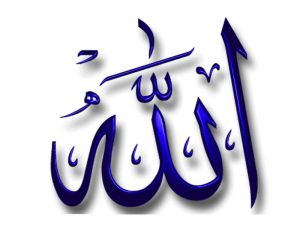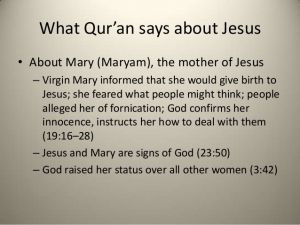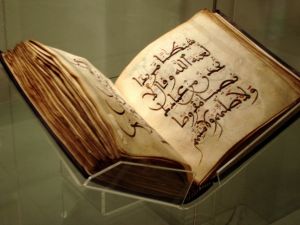Misconceptions about Allah: Is Allah God ? Yes, Allah is God. He is Allah, the One and Only. He is the same God worshipped in the Jewish and Christian faiths and is recognisable as such. Across the globe and throughout history people of all faiths and beliefs have turned towards God, or a supreme deity, the Creator of the universe. He is Allah. Allah is God. God the Creator. God the Sustainer.
Yes, Allah is God. He is Allah, the One and Only. He is the same God worshipped in the Jewish and Christian faiths and is recognisable as such. Across the globe and throughout history people of all faiths and beliefs have turned towards God, or a supreme deity, the Creator of the universe. He is Allah. Allah is God. God the Creator. God the Sustainer.
The word God is spelled and pronounced differently in many languages: the French call him Dieu, the Spanish, Dios and the Chinese refer to the One God as Shangdi. In Arabic, Allah means the One True God, worthy of all submission and devotion. Jewish and Christian Arabs refer to God as Allah, and He is the same One True God referred to in the Biblical passage,
"Hear O Israel, the Lord your God is One". (Deuteronomy 6.4 & Mark 12.29)
In all three monotheistic religions (Judaism, Christianity and Islam) God and Allah are the same. However, when asking the question, Is Allah God, it is equally important to understand who Allah is not.
He is not a man, nor is He an ethereal spirit, therefore when Muslims talk about Allah there is no concept of a trinity. He was not begotten nor does He beget, therefore He does not have sons or daughters. He does not have partners or underlings; therefore, there are no demi gods or minor deities inherent in the concept of Allah. He is not part of His creation and Allah is not in everybody and everything. Consequently, it is not possible to become allahlike or attain allahhood.
The Story of Jesus and Mary in the Holy Qur'an The Birth of Mary
The Birth of Mary
“Indeed God chose Adam, Noah, the family of Abraham and the family of Imran over the worlds. An offspring, like one another (in righteousness). And God is All-Hearing, All-Knowing. (And mention) when the wife of Imran said, ‘O my Lord, I
have vowed to You what is in my womb, to be dedicated (to Your service), so accept this from me. Indeed, You are All-Hearing, All-Knowing.’ Then when she delivered her (Mary), she said, ‘O my Lord, I have delivered a female,’ and God knew best what she delivered, ‘And the male is not like the female, and I have named her Mary, and I seek refuge with You for her and for her children from Satan, the expelled (from the mercy of God).’” (Qur’an 3:33-36)
The Childhood of Mary
“So her Lord fully accepted her, and gave her a good upbringing, and put her under the care of Zechariah. Every time Zechariah entered upon her in the prayer room, he found her supplied with food. He said, ‘O Mary, where do you get this from?’ She said, ‘This is from God. Indeed, God provides for whom He wills, without limit.’”(Qur’an 3:37)
Preservation and Literary Challenge of the Quran Memorisation: In the ancient times, when writing was scarcely used, memory and oral transmission was exercised and strengthened to a degree now almost unknown.' relates Michael Zwettler. It was in to this 'oral' society that Prophet Muhammad was born. During its revelation, which spanned twenty three years, not only did the Prophet teach the Qur'an, he memorised it entirely himself as did many of his Companions amongst them; Abu Bakr, Umar, Uthman, Ali, Ibn Masud, Abu Hurairah, Abdullah bin Abbas, Abdullah bin Amr bin al-As, Aisha, Hafsa, and Umm Salama. The Angel Gabriel would spend every night in the month of Ramadhan with the Prophet, on a yearly basis, to refresh his Qur'anic memory.
Memorisation: In the ancient times, when writing was scarcely used, memory and oral transmission was exercised and strengthened to a degree now almost unknown.' relates Michael Zwettler. It was in to this 'oral' society that Prophet Muhammad was born. During its revelation, which spanned twenty three years, not only did the Prophet teach the Qur'an, he memorised it entirely himself as did many of his Companions amongst them; Abu Bakr, Umar, Uthman, Ali, Ibn Masud, Abu Hurairah, Abdullah bin Abbas, Abdullah bin Amr bin al-As, Aisha, Hafsa, and Umm Salama. The Angel Gabriel would spend every night in the month of Ramadhan with the Prophet, on a yearly basis, to refresh his Qur'anic memory.
The lives of Muslims revolved solely around the Qur'an; they would memorise it, teach it, recite portions from it every day for their obligatory Prayers - and many would stand a third of the night in prayer reciting from it. There existed so many memorisers of the Qur'an, that it was considered strange to find a family without someone amongst them who had not memorised the Qur'an entirely.
As time progressed, literally thousands of schools were opened devoted specifically to the teaching of the Qur'an to children for the purpose of memorization. The teachers in these schools would have unbroken Tazkiya's [authoritative chains of learning] going back to the Prophet himself through his many Companions - and this system exists even today.
Three Lines that Changed the World: The Inimitability of the Shortest Chapter in the Qur'an Inna aAtayna kal kawthar (Verily We have given to you the abundance) إِنَّا أَعْطَيْنَاكَ الْكَوْثَرَ
Inna aAtayna kal kawthar (Verily We have given to you the abundance) إِنَّا أَعْطَيْنَاكَ الْكَوْثَرَ
Fasalli li rabbika wanhar (So pray to your Lord and sacrifice) فَصَلِّ لِرَبِّكَ وَانْحَرْ
Inna shani-aka huwal abtar (Indeed your enemy is the one who is cut off) إِنَّ شَانِئَكَ هُوَ الْأَبْتَرُ
Chapter al-Kawthar (The Abundance) is the smallest chapter in the Qur'an consisting of only three lines. From a linguistic, literary, theological, rational and ideological point of view this chapter has the utmost significance. Being the smallest chapter in the Qur'an it is often cited by those who are involved in some form of polemic. This is due to the famous challenge of the Qur'an. The Qur'an states:
"If you (mankind) are in doubt concerning what We revealed to Our servant, than bring a chapter like it...." Qur'an 2:23
Haman and Pharaoh The Qur'an relates the life of the Prophet Musa (as) with great clarity. As it tells of the conflict with the Pharaoh and his dealings with the Children of Israel,
The Qur'an relates the life of the Prophet Musa (as) with great clarity. As it tells of the conflict with the Pharaoh and his dealings with the Children of Israel,
the Qur'an reveals a wealth of information about ancient Egypt. The significance of many of these historical points has only recently come to the attention of the learned people of the world. If one considers these points with reason, it quickly becomes clear that the Qur'an, and the fountain of information contained within it, has been revealed by the All-Wise Allah for it correlates directly with all major scientific, historic and archaeological finds in recent times.
One such example of this wisdom can be found in the Qur'anic references to Haman: a character whose name is mentioned in the Qur'an, along with the Pharaoh. He is mentioned in six different places in the Qur'an, in which it informs us that he was one of Pharaoh's closest allies.
